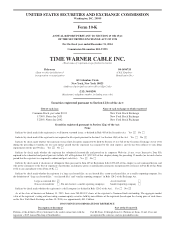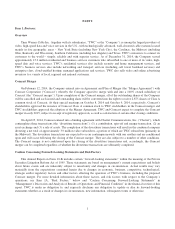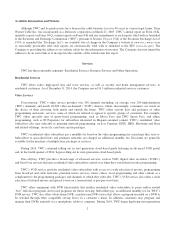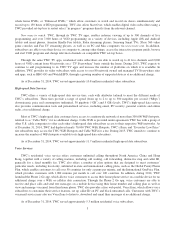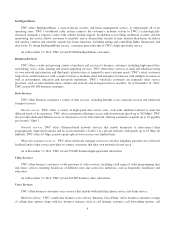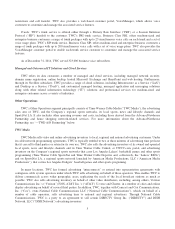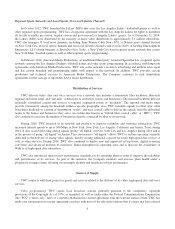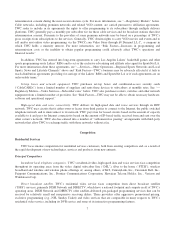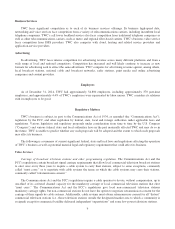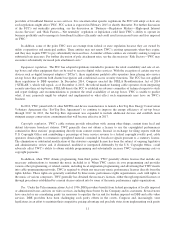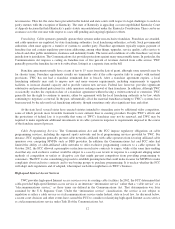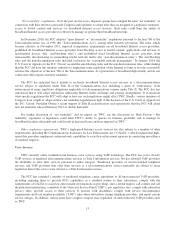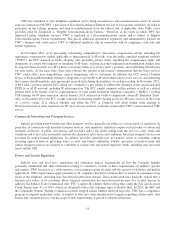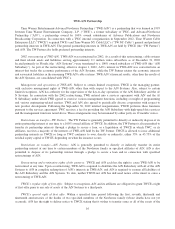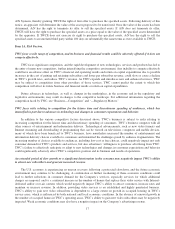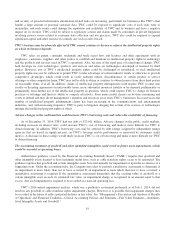Time Warner Cable 2014 Annual Report Download - page 17
Download and view the complete annual report
Please find page 17 of the 2014 Time Warner Cable annual report below. You can navigate through the pages in the report by either clicking on the pages listed below, or by using the keyword search tool below to find specific information within the annual report.Business Services
TWC faces significant competition as to each of its business services offerings. Its business high-speed data,
networking and voice services face competition from a variety of telecommunications carriers, including incumbent local
telephone companies. TWC’s cell tower backhaul service also faces competition from traditional telephone companies as
well as other telecommunications carriers, such as metro and regional fiber-based carriers. TWC’s business video service
faces competition from DBS providers. TWC also competes with cloud, hosting and related service providers and
application-service providers.
Advertising
In advertising, TWC faces intense competition for advertising revenue across many different platforms and from a
wide range of local and national competitors. Competition has increased and will likely continue to increase as new
formats for advertising seek to attract the same advertisers. TWC competes for advertising revenue against, among others,
local broadcast stations, national cable and broadcast networks, radio stations, print media and online advertising
companies and content providers.
Employees
As of December 31, 2014, TWC had approximately 54,800 employees, including approximately 370 part-time
employees, and approximately 4.4% of TWC’s employees were represented by labor unions. TWC considers its relations
with its employees to be good.
Regulatory Matters
TWC’s business is subject, in part, to the Communications Act of 1934, as amended (the “Communications Act”),
regulation by the FCC, and other regulation by federal, state, local and foreign authorities under applicable laws and
regulations. Various legislative and regulatory proposals under consideration from time to time by the U.S. Congress
(“Congress”) and various federal, state and local authorities have in the past materially affected TWC and may do so in
the future. TWC is unable to predict whether any such proposals will be adopted and the extent to which such proposals
may affect its business.
The following is a summary of current significant federal, state and local laws and regulations affecting the operation
of TWC’s business as well as potential material legal and regulatory requirements that could affect its business.
Video Services
Carriage of broadcast television stations and other programming regulation. The Communications Act and the
FCC’s regulations contain broadcast signal carriage requirements that allow local commercial television broadcast stations
to elect once every three years to require a cable system to carry their stations, subject to some exceptions, commonly
called “must carry,” or to negotiate with cable systems the terms on which the cable systems may carry their stations,
commonly called “retransmission consent.”
The Communications Act and the FCC’s regulations require a cable operator to devote, without compensation, up to
one-third of its activated channel capacity for the mandatory carriage of local commercial television stations that elect
“must carry.” The Communications Act and the FCC’s regulations give local non-commercial television stations
mandatory carriage rights, but non-commercial stations do not have the option to negotiate retransmission consent for the
carriage of their signals by cable systems. Additionally, cable systems must obtain retransmission consent for all “distant”
commercial television stations (i.e., those television stations outside the designated market area to which a community is
assigned) except for commercial satellite-delivered independent “superstations” and some low-power television stations.
9


